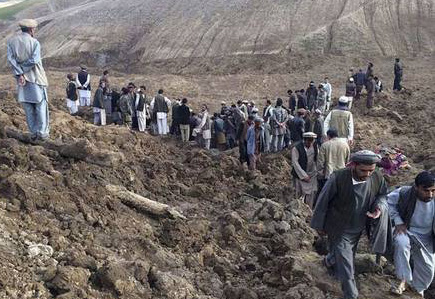By Lewis Smith
Officials in Afghanistan have said that at least 2,000 people are feared dead after a mountainside collapsed causing a massive landslide in a remote region of the country.
Seven people were pulled alive from the mud and debris that flattened 300 homes but rescuers were pessimistic about anyone else being alive beneath the piles of earth.
Many victims were villagers who dashed to help their neighbours when a landslide struck but were then caught in a second wave of mud. It was reported that a wedding was taking place in the village.
“Now we can only help the displaced people. Those trapped under the landslide and who have lost lives, it is impossible to do anything for them,” said Major General Faziluddin Hayar, the Badakhshan provincial police chief.

The landslide is believed to have been triggered by heavy rain which has swept the region for several days. (Photo: Reuters)
Those who were caught by the catastrophic landslip were from the village of Hobo Barik, about a third of which was wiped out, and most would have been at home rather than at work because it was a day of worship.
Up to 600 people from nearby villages made their way to Hobo Barik, in the north east of the country, to try to help the rescue operation but were severely hampered by a lack of shovels and machinery. The mud covering the devastated village was said to be several metres thick.
The landslide is believed to have been triggered by heavy rain which has swept the region for several days. Landslide and avalanches are common in the province but are rarely so deadly.
Ari Gaitanis, of the United Nations Assistance Mission in Afghanistan, said 350 people had been confirmed dead and that the UN is trying to help the rescue operation.
Shah Waliullah Adeeb, the regional governor, said more than 2,000 people had yet to be accounted for and he issued a plea for equipment: “It’s physically impossible right now. We don’t have enough shovels; we need more machinery.”
Mohammad Zakria Sauda, a local MP, said the casualties included many children, and he estimated the likely death toll at 1,000 people. “At first a small part of the hill came down, and then when people went to help the other big part came down,” he said. “Casualties could be as many as 1,000 people. Children, women are stuck under the soil.”
President Barack Obama, speaking at a White House news conference with German Chancellor Angela Merkel, expressed his sympathy for the Afghan people.
“Just as the United States has stood with the people of Afghanistan through a difficult decade, we stand ready to help our Afghan partners as they respond to this disaster, for even as our war there comes to an end this year, our commitment to Afghanistan and its people will endure,” he said.
Badakhshan province, in the Hindu Kush and Pamir mountain ranges and bordering China, is one of the most remote in the country.
A landslide in Baghlan province, also in northeastern Afghanistan, killed 71 people in 2012. After days of digging unearthed only five bodies, authorities decided to halt the recovery effort and turn the area into a memorial for the dead. In February 2010 more than 170 people were killed by an avalanche at the 12,700-foot-high (3,800-meter) Salang Pass, which is the major route through the Hindu Kush mountains that connects the capital to the north.
Independent staff contributed to this report



